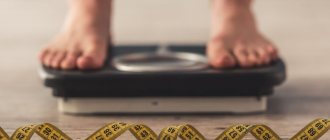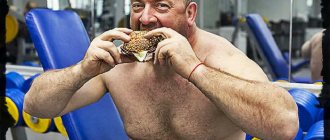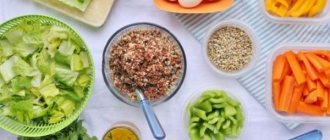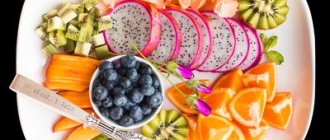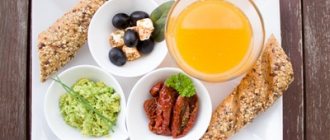From a nutritional perspective, what we eat every day creates our health and well-being. It is the first meal of the day – breakfast – that is considered the most important. It sets the tone for the whole day and allows you to feel cheerful and full of energy, forgetting about hunger for a long time. However, not only breakfast, but lunch and dinner also need to be done correctly.
Good nutrition is the key to health
Satisfying hunger is one of the basic human instincts that guarantees the maintenance of life. That is why it is extremely important what we eat, at what time and in what quantities. The foods you eat directly affect your health. Improper nutrition is fraught with damage to both individual human organs and the entire body. Such disastrous results can be caused by food that is defective in its composition, or by its lack or excess. Therefore, it is very important to pay due attention to your nutrition.
Dinner
In theory, for energy balance it does not matter what time of day the calories come in. At night, the body burns them to maintain vital functions almost as actively as during the day. But still, dinner is different from breakfast and lunch - after it we usually do not work, but relax and sleep.
What
When choosing food for dinner, you can follow two principles.
- Do not provoke overeating. This is usually done by foods containing large amounts of sugar and salt. Due to daily fluctuations in the level of the satiety hormone leptin, sensitivity to sweets is higher in the evening, so the likelihood of eating an extra piece of cake is greater. And salty foods stimulate the production of the hunger hormone - ghrelin. Alcohol can also trigger overeating.
- Don't ruin your sleep. Starchy vegetables (potatoes, corn) and legumes (beans, lentils) in combination with fats and spices often cause a feeling of heaviness and bloating in the stomach.
A good option is protein (fish, chicken or steak) plus non-starchy vegetables (broccoli, bell peppers), greens (arugula salad, spinach) and vegetable fats (olive or coconut oil) and for dessert - berries (a little glucose and a lot of fiber) .
When
Ideally, two to three hours before bedtime and at approximately the same time. There are several reasons.
- If you lie down immediately after eating, heartburn may occur. In a horizontal position, the effect of gravity that helps keep stomach contents down is lost, so it can leak back into the esophagus and cause irritation.
- Eating at different times increases the risk of developing metabolic syndrome : obesity around the waist, insulin resistance, hypertension and high cholesterol. The exact reasons are unknown, but there is speculation that this may be due to an imbalance in our “internal clock”.
- Eating immediately before bed can disrupt circadian rhythms : insulin, which is released to absorb glucose from the blood, triggers the synthesis of special proteins that disrupt the cellular clock.
- When having a late dinner (after 10 pm), peak glucose levels after eating are on average 20% higher . A possible reason is relaxation of muscles that could absorb excess sugar. But light physical activity before bed, for example, a half-hour walk, solves the problem.
How many
The standard dietary recommendation is to consume the same amount of calories for dinner as for lunch: approximately 40% of the daily value.
Some nutritionists, like Daniela Jakubovich, advise reducing the share of dinner to 20%. This has its own logic: in the morning the body needs calories more - it uses them 2.5 times more actively to generate heat. But the main thing is not to make dinner the main meal of the day. If you know you'll be home late, obesity expert Lisa Diewald recommends eating a high-protein snack in advance in the late afternoon to curb hunger. For example, Greek yogurt with nuts. NEW REPORT. We'll be finishing up the nutrition report soon. It is called “Rules of Food” because we have collected fundamental principles in it, following which you can easily navigate both the endless stream of information about nutrition and the food itself. This report will be useful to everyone who understands that health and longevity largely depend on nutrition. Pre-orders are now open at a discount.
What is the essence of proper nutrition?
The most important thing is to follow the regime, adhering to certain principles, and make sure that the products entering the body are fresh and of high quality.
When forming your daily diet of proper nutrition, rely on simple rules :
1) Every day you must eat five food groups :
- cereals, grains;
- fresh fruits;
- meat, offal, eggs;
- vegetables;
- dairy products.
In order for nutrition to be healthy, it is important to control the balance of substances entering the body. By eating one product from each group daily, you can easily achieve this.
2) It is necessary to separate foods for breakfast, lunch and dinner.
For breakfast, it is better to eat dairy products, grains or cereals. For lunch - meat and fresh vegetables. For dinner - lighter but satisfying foods (fish, stewed vegetables, fermented milk products).
3) You can’t refuse snacks
Snacks are second breakfast, afternoon snack, late dinner.
The names are different, but the essence is the same. You can snack on fruits, juices, vegetables, and dairy products.
How much should you eat for breakfast?
It is believed that in the first half of the day you need to eat most of the food, in the second - less.
How to choose the right breakfast: practice
20 healthy breakfast menus for all occasions from experts TakZdorovo.ru
That is, breakfast should be quite hearty.
For an ordinary person with an average calorie expenditure of 2000 per day, the calorie content of breakfast should be approximately 400 kcal
, and the calorie content of a snack should be 200 kcal. If you want to know a more accurate figure, use our calculator and determine your daily energy requirement. Breakfast should account for 20 percent of the daily requirement, and snacks should account for 10 percent.
Principles of proper nutrition
Breakfast
You should always have breakfast, no matter what. Make it a habit. Same as brushing your teeth in the morning. A proper breakfast will give you a tremendous boost of energy for the whole day. If it’s hard to eat in the morning (“you can’t get a piece of food down your throat”), try not to overeat in the evening. Those who do not fill their stomachs at night have breakfast in the morning with great pleasure.
Water
Don't neglect simple clean water. You need to drink a lot (at the rate of 30 ml per 1 kg of weight). Be sure to drink a glass of water in the morning on an empty stomach. Drink it between meals. This may not be easy at first. Then introduce gradually. In just a couple of weeks, water will become your favorite drink.
Frequent meals
You need to eat in small portions, but often. Excellent option: breakfast, second breakfast, lunch, afternoon snack, dinner, second dinner. It turns out that there are three main meals and two additional ones. An ideal nutrition plan that keeps you full throughout the day and protects you from overeating or undereating.
Last meal 2-3 hours before bedtime
Not eating after six in the evening if you go to bed at two in the morning is fundamentally wrong. This approach has nothing to do with proper nutrition. Eating after six is not only possible, but also necessary for those who fall asleep very late. Don't overeat 2-3 hours before bedtime - that's what's really important.
Fats are not harmful
Fats are vital for any body. By eliminating them completely, you risk facing serious health problems. It is necessary that the body receives at least one gram of fat per kilogram of body weight.
Carbohydrates aren't scary
There are two types of carbohydrates: fast and slow. Slow ones charge the body with energy. If you eat them in small quantities, you may simply not have enough strength, and high fatigue will be noticeable. Consume carbohydrates per day at the rate of three grams per kilogram of weight.
When should you eat?
It’s rare that any of us can allow ourselves to wake up in the morning when we would like. The work schedule dictates its conditions. In addition, for most of us, the morning hours are the most productive. This is especially true for brain activity. And in order to start the thought process, you need to feed yourself, and feed yourself on time.
It is ideal to have breakfast 30-40 minutes after waking up. On average, waking up at 7 o'clock in the morning, at 7:30 you need to sit down at the table, where ready-made, fresh and aromatic food is already waiting. Half an hour will be spent on the morning toilet and preparing breakfast.
If there are 2 morning meals, then you need to organize the second one 2-3 hours after the first, that is, around 11 am. Few people can afford to eat leisurely and fully at work. However, it is quite possible to take with you, for example, a smoothie or liquid oatmeal and drink it while supposedly going for a smoke break - if you have the desire.
As a rule, you need to have lunch every 2-3 days, but with dinner it’s not so simple. It is known that it should be 2 hours before bedtime. But the time when a person goes to bed is different for everyone. Ideally, your last meal should not occur later than 6 pm. However, if you really want to, you can drink a glass of kefir before bed or eat an apple - such a snack will not harm.
Proper nutrition. Sample menu
Breakfast
Must include: slow carbohydrates, proteins and fats .
Slow carbohydrates: any porridge, whole grain bread (may be marked “without flour”). Proteins: meat, fish, seafood, eggs (you can make an omelet or scrambled eggs), legumes, tofu. Fats: cheese, dairy products, any fatty fish, vegetable oils, nuts, avocado, flaxseed oil, olive oil, fish oil.
Lunch
Cottage cheese, cottage cheese casserole, cheesecakes, kefir, vegetables, fruits, berries - any product of your choice.
Dinner
Must include: meat, cereals and vegetables .
Instead of meat, you can eat liver, fish or seafood, and replace cereals with durum pasta. Vegetables can be consumed in any form: fresh, in salad, baked, steamed or grilled.
Afternoon snack
Cottage cheese, cottage cheese casserole, kefir, vegetables, vegetable salad, nuts and fruits until 16:00, sandwich: bread and chicken or liver pate - any product of your choice.
Dinner
Must include: protein and fiber .
Protein: chicken, turkey, seafood, lean fish, eggs, omelet, cottage cheese. Fiber: Green vegetables, steamed or grilled vegetables, but not starchy ones.
Late dinner
Any fermented milk product of your choice.
Dinner
You may be a skeptic, but you firmly believe that lunch should consist of first, second and third. Because this is not just a meal, but a social ritual with its own traditions and mythology. Let's try to separate myths from facts.
What
- Soup for starters? It's possible, but not necessary. Soup has no advantages over solid food. Just like the proverbial sandwich, it can be unhealthy or healthy depending on the ingredients, how they are processed and the serving size. If you're watching calories, choose vegetable soups - they have about 18 calories per 100 ml. For comparison, there are more of them in a bowl of thick cream of chicken soup than in a Big Mac.
- Hot or cold? It doesn't matter either. A hot soup or a blazing hot cutlet cannot warm you up from the inside, and a cold salad cannot cool you down. During digestion, any product is heated (or cooled) to body temperature.
- Pasta or salad? Both. Lunch is a good time for carbohydrates, especially complex ones (porridge, whole grain bread, starchy vegetables such as potatoes or turnips). As Pamela Pick, a physician and author of The Hunger Fix, explains, in the first half of the day (before 3 p.m.), our body most actively burns the glucose it produces. But to maintain energy for as long as possible, it’s worth adding fiber to them: cabbage, leafy greens, fruits or berries for dessert.
Where
When working remotely, it’s not a question of whether you order food from your favorite company or cook it yourself. But if you work in an office, doubts begin: take lunch from home or go to a cafe/restaurant? Briefly - the second. And that's why.
- A study has shown that eating out not only lifts your mood, but also relieves you from obsessing over work, especially if you are a workaholic.
- After a high-calorie meal, it is useful to walk for at least half an hour to prevent a sharp rise in blood sugar levels (this can cause fatigue and headaches). And the best way not to miss a walk is to choose a cafe or restaurant at some distance from the office.
- And finally, in a restaurant you can always spontaneously try something new, and our brain loves novelty and rewards it with a dose of dopamine. By the way, it’s very easy to check the freshness of the products on the menu: order seasonal vegetables - now in May these are, for example, young zucchini.
When
Between 10 am and 2 pm, when our metabolism is most active. The window is wide enough not to miss.
- What is important here is not so much specific time as consistency. The body likes to eat at certain times: research shows that lack of regularity in eating can throw off our circadian rhythms, like jet lag.
- Don’t wait until you begin to experience brutal hunger. As it turned out, this is often the reason for overeating during lunch.
How many
You have two tasks: 1) provide the body with energy for the second half of the day; 3) reduce the risk of snacking and overeating in the evening. The classic recommendation is to consume two-thirds of your calories in the first half of the day, dividing them between lunch and breakfast.
- The proportion of fats, proteins and carbohydrates can be determined by eye by the amount of food on the plate: a little more than half is carbohydrates (for example, beans), the rest is approximately equal - proteins (meat, poultry or fish) and fats (nuts, cheese, avocado). This is the formula used in a study that showed that eating a nutritious lunch helps improve weight control.
- Overly complex restaurant dishes, especially salads, may contain unobvious ingredients that increase the calorie content or glycemic index. To make it easier to control them, choose whole foods: coarsely chopped vegetables and fruits.
